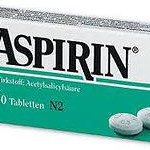Aspirin and heart disease
-What is the appropriate aspirin dose for those worried about heart disease? I have high cholesterol and my father died at 49 of a heart attack.-
You ask a straightforward question for which the answer is much more complicated. The first question is not what dosage but whether one should take aspirin at all because of concern about heart disease. The short answer is, “It depends.”
The potential benefit to heart patients from aspirin is based on its ability to inhibit the function of blood platelets, components of the blood that contribute to clotting. Strong scientific evidence indicates benefit in persons with known coronary heart disease and prior heart attack, unstable angina and bypass surgery.
But taking aspirin is not without risk. Aspirin use may lead to an increased risk of bleeding from ulcers, injuries or surgery. Aspirin should not be taken in addition to anticoagulant medication such as warfarin (Coumadin). It takes at least 10 days for the platelets to fully recover from the effects of aspirin use after it is stopped. In addition, some people are allergic to aspirin.
So, evidence of benefit is not clear-cut for people with no history of heart disease. Because of this, most physicians do not advise aspirin use on a routine basis in people with coronary risk factors in the absence of evidence of coronary disease.
Finally, your question of dosage: One “baby aspirin,” (one-fourth the size of a regular aspirin tablet) taken daily is sufficient to achieve inhibition of platelet function.



